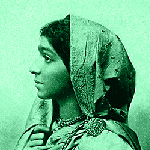
Sign up for our newsletter
The Read & Co. Newsletter will bring you our latest books, blogs, facts and of course news.

What care I for the world’s loud weariness, Who dream in twilight granaries Thou dost bless With delicate sheaves of mellow silences?Two distinguished poet-friends of Mrs Naidu—Mr Edmund Gosse and Mr Arthur Symons—have introduced her two principal volumes of verse with interesting biographical notes. The facts thus put in our possession convey a picture to the mind which is instantly recognizable in the poems.A gracious and glowing personality appears, quick and warm with human feeling, exquisitely sensitive to beauty and receptive of ideas, wearing its culture, old and new, scientific and humane, with simplicity; but, as Mr Symons says, “a spirit of too much fire in too frail a body,” and one moreover who has suffered and fought to the limit of human endurance.We hear of birth and childhood in Hyderabad; of early scientific training by a father whose great learning was matched by his public spirit: of a first poem at the age of eleven, written in an impulse of reaction when a sum in algebra ‘would not come right’: of coming to England at the age of sixteen with a scholarship from the Nizam college; and of three years spent here, studying at King’s College, London, and at Girton, with glorious intervals of holiday in Italy.We hear, too, of a love-story that would make an idyll; of passion so strong and a will so resolute as almost to be incredible in such a delicate creature; of a marriage in defiance of caste, a few years of brilliant happiness and then a tragedy. And all through, as a dark background to the adventurous romance of her life, there is the shadow of weakness and ill-health. That shadow creeps into her poems, impressively, now and then. Indeed, if it were lacking, the bright oriental colouring would be almost too vivid. So, apart from its psychological and human interest, we may be thankful for such a poem as “To the God of Pain.” It softens and deepens the final impression of the work.
– An Excerpt by Mary C. Sturgeon, Studies of Contemporary Poets, 1916

The Read & Co. Newsletter will bring you our latest books, blogs, facts and of course news.
Copyright © 2020 – present. Read & Co. Books Websites and Content. All rights reserved.